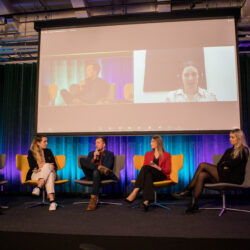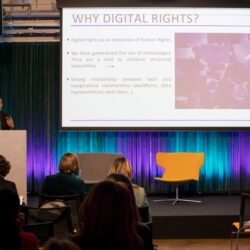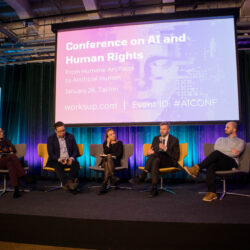Last Thursday, on January 26, we hosted a high-level hybrid conference “Artificial Intelligence and Human Rights. From Humane Artifacts to Artificial Human” in Tallinn. At the event, international experts discussed the interlink between artificial intelligence (AI) and human rights as well as the risks present. The topics varied from the necessity for a legal framework regulating artificial intelligence, the potential risks and biases which accompany its use and the use of artificial intelligence in armed conflict. We also turned our attention to the atmosphere of fear which has arisen in society due to the mystification of the topic, usually coming from a lack of knowledge and research regarding artificial intelligence. The presentations and discussions from the conference can be viewed on our Youtube channel.
The need for regulation to manage the use of artificial intelligence
One of the main topics of the conference touched upon the regulation of AI. Do we need a separate act or are existing laws enough to control the fulfillment of human rights? Adjunct Professor of Communications Law at the Tallinn University of Technology and Senior Legal Expert at the Estonian e-Governance Academy Dr Katrin Nyman-Metcalf believed the necessity behind AI regulation to be questionable and brought up the risk of over-regulation. Since one act cannot possibly cover all risks, it could be that in enacting it, the regulation will only fulfill a bureaucratic objective rather than being applicable in practice.
In the first panel discussion of the conference (speakers Elvīra Krēķe, Florian Marcus, Dr Orsolya Reich, Merili Koppel, Sara Polak) on the ethics and regulation of AI, speakers also found that the biggest counterpoint to new regulations is their weak enactment. It was seen as important to rather turn attention to existing regulations, to fix their transparency and applicability. Founder and Researcher at the CCHAOS Research Group and anthropologist Sara Polak emphasized that with regards to the advancement of AI, it is necessary to first and foremost educate people. It is important that citizens as well as government institutions and other institutions responsible for regulating artificial intelligence are aware of the matter and in the know with all its advancements.
Council of Europe’s Director of Information Society and Action against Crime, Directorate General Human Rights and Rule of Law Jan Kleijssen introduced conventions that regulate cyber crime and data protection. In introducing and regulating AI, it is important that specialists working in the field have the respective trainings. In order to prevent mistakes we must be critical of decisions made with the help of artificial intelligence and to not overestimate the capabilities of the program. In ensuring the benefits which accompany the use of AI, human rights and environmental sustainability should always be at the forefront and in situations, where the latter cannot be ensured, the use of AI should be waived.
Quality and transparency of data
Policy and Advocacy Advisor for Digital Rights at ENAR, the European Network Against Racism, Oyidiya Oji, whose work is focused on ensuring equal rights in regulations involving AI, raised the question of the data used by AI and its quality. The stereotypical opinions present in our society are also affecting technology through the biased data used by it, which means that artificial intelligence is not objective in its decision-making. The information on the data being used should be transparent and traceable. Data, which is used for advancing AI, conclusions, which are made by the available information as well as the profiling of marginalized societal groups should be handled with care.
Dr David Reichel, project manager in the Data and Digital Sector at the European Union Agency for Fundamental Rights (FRA) presented a report made by the agency on data bias. On the basis of data from social media, the agency analyzed terms, which an algorithm described as hate speech. They found that the algorithm was ethnically biased, especially towards muslims and jews. Dr Reichel emphasized the need for constant testing as well as the diversifying and protection of data to ensure their objectiveness and amend their quality.
An existential threat
Jaan Tallinn, founding engineer of Skype and Kazaa and co-founder of the Cambridge Centre for the Study of Existential Risk, shared his thoughts about the advancement and dangers of AI to humanity. In his opinion, in today’s world there is not nearly enough effort to research the potential threats of artificial intelligence. The issue is complicated and new, which makes it difficult to make risk analyses. However, the qualities and powers of AI should not be overstated or mystified. According to Tallinn, current AI programs do not pose an existential threat to humanity in the near future. What we should focus on, however, is the question of control and renouncement of judgement, as well as how to motivate AI to follow the needs and wishes of humankind.
The conference was concluded by a panel discussion (speakers Dr Tayfun Kasapoglu, Lauri Almann, Piret Pernik, Dr David Reichel), which focused on security and the use of AI in situations of conflict. The speakers talked about the dangers of data collection, the information war between China and the U.S. and the vulnerability of refugees. On the matter of using artificial intelligence in crisis, the speakers shared doubts about the delegation of responsibilities and human involvement. They reached a conclusion that AI on its own cannot be accounted for in conflict just yet.
Look at the introductions of the speakers at our homepage.
The conference was organized by the Estonian Human Rights Centre and financed by the Luminate Foundation as part of the centre’s digital rights project.
The summary was composed by the Estonian Human Rights Centre’s volunteer Karolin Martinson.
Since you are here...
It is important to protect everyone’s human rights, because it helps to keep stability and peace in the society. There are many challenges for protection of human rights in Estonia: intolerance has really come out of the closet. Bad things happen when good people are too passive, but together we can make a change.
Estonian Human Rights Centre is the competent, accountable and impactful independent human rights organisation in Estonia. Your recurring or one-time donation helps to stand up for human rights everywhere: in courts, in the media, in schools, in the workplace, on the streets and in governmental venues.
Donating is easy, and you can use your credit card if donating from abroad.
Donate now





